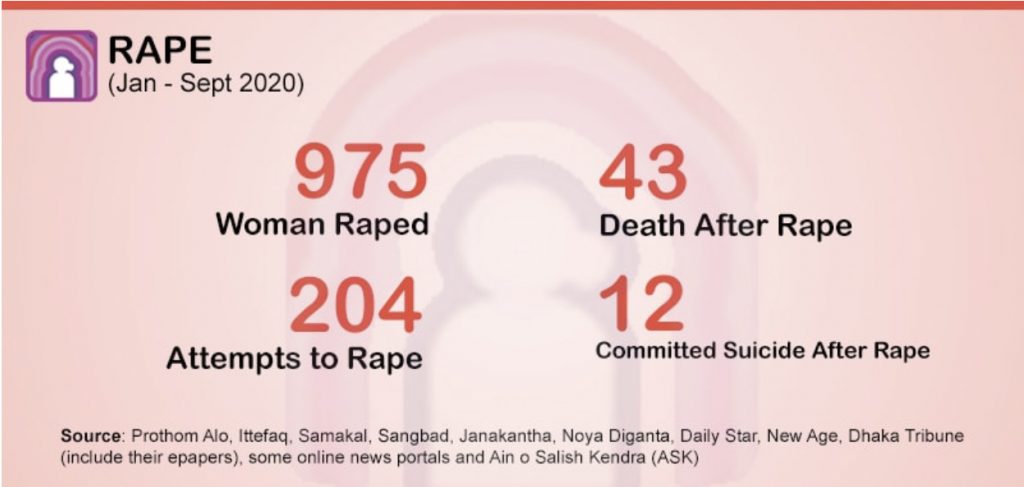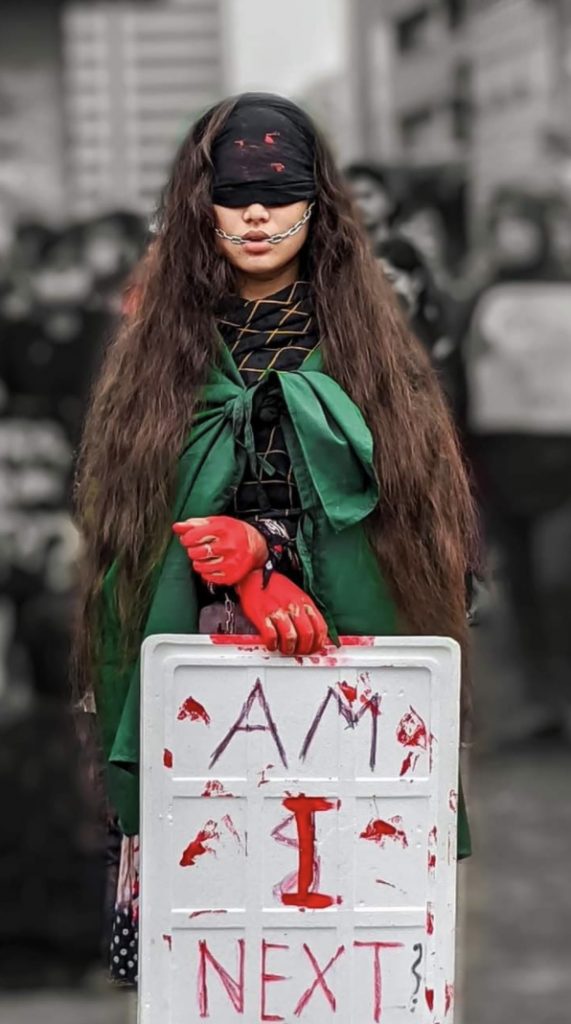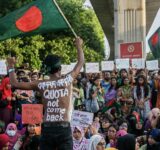Amidst the global health emergency centering around COVID-19, Bangladesh battles with a different emergency. During the pandemic, rape has filled the news. “It’s in the newspaper, on Facebook, every day,” commented a female student. “There’s no way not to look at it.”
Over a thousand women have been raped this year already, of which one fifth was subjected to gang rape. Government data agencies do not list the number of rapes specifically. They instead lump them together under the category of “women and child repression.”

Anger had been building against the government and the police for perceived inaction in several rape cases for months, but a 30-minute video of a woman being stripped and sexually assaulted by a group of men, which spread quickly across social media, triggered huge protests all over the country. What’s more upsetting is that such actions were not yet included under rape.
The police have now arrested eight suspects for the assault that was caught on camera more than a month ago in Noakhali. The UN has commented that the gang rape in Noakhali underlined the “state of social, behavioral and structural misogyny” in Bangladesh.
President Abdul Hamid hastily signed the “Women and Children Repression Prevention (Amendment) Bill” into law on Tuesday, according to Law and Justice Minister Anisul Huq, to incorporate the death penalty for all the four types of rape defined under Bangladeshi law. The country’s existing laws mandate a life prison sentence for rape convictions, but now courts will be able to choose between a life sentence and death.
Nationwide Anti-Rape Protests Rage On
Under the banner of “Bangladesh Against Rape”, leaders and activists of different student organizations began demonstrating from October 5, and soon, masses were seen assembling in the capital’s Shahbagh, Uttara, and Gulshan 2 areas to join “Rage against Rape” protests. Police were reported to be attacking the peaceful protests on several occasions. Hundreds of women of different backgrounds have gathered with festoons and placards demanding exemplary punishment for the rapists.

Protests outside Dhaka
Public decry echoed outside the capital with the recent rape incidents acting as catalysts. People from all demographics, including teachers, students, journalists, lawyers and members of civil society of a number of districts, including Sunamganj, Meherpur, Tangail, Rajshahi, Chuadanga, Comilla, Bhola, Bramanbaria, Satkhira, Rajshahi and Narayanganj protested and sought justice for the rape survivors.
“If the law has been passed, why hasn’t the protest stopped?”
Many protesters never demanded the death penalty because it is not considered a real solution to the country’s sexual violence problem. Several activists claim it to be more a cop-out than a meaningful commitment to protect women. Rape is, on a larger frame, a systemic problem deeply rooted in the fabric of our patriarchal society.
1. Making Conviction Harder
The conviction rate for rape cases in Bangladesh is less than 3%, and a large chunk of the blame falls on the country’s police for inability or unwillingness to properly investigate forensic evidence. Activists believe rape often goes unreported in Bangladesh because of social stigma, lengthy justice process, and fear of harassment by offenders. Unfortunately, the conviction rates will further drop down as a consequence of the new law because victims will have a larger burden on themselves to prove to court before they can get justice. Moreover, more than 54% sexual perpetrators are known acquaintances of the victim, and since people could lose lives if the crime is reported, their allies will pressurize and gaslight the victims more to discourage them.
2. Escaping Accountability
Public frustration with the authorities is on the rise because recent high-profile rape cases have seen the rapists and perpetrators of violence being members of the state agencies and institutions. This is perpetuating a clear lack of faith not just in the judicial system but in state institutions as a whole. Protesters have called for systemic reconstruction in the country.
3. The Rape Culture
People marching under the #RageAgainstRape banners are protesting not only specific rape incidents but also the victim-blaming culture prevalent in our mindsets, because the government’s amendment has yet to identify and deal with this massive systematic drawback.
Several demonstrators at the Shahbagh intersection demanded the resignation of Home Minister Asaduzzaman Khan Kamal for failing to stop the rapes across the country. Kamal had made bizarre trivializing comments on rape- encouraging rapists- addressing a party program on September 29, saying rape was not a social menace exclusive to Bangladesh as there was no country where such incidents did not happen.
At the weekend, Ananta Jalil, a well-known actor, posted a video in which he said women who wore revealing dresses were inviting rape.
4. Outdated law and justice system
The death penalty does not take into account that most rapists are not outliers, rather people around us- “our husbands, our brothers, our fathers, our teachers”. Many of the laws on sexual violence date back to British rule. The Evidence Act of 1872 allows defense lawyers to “character assassinate” the woman to discredit her by her previous sexual relationships or her clothing.
The death penalty already exists in Bangladesh under Section 9 of the 2000 Act which includes gang-rape and rape leading to death. The reintroduction of the death penalty essentially means rapists in all rape cases will receive death sentence as maximum punishment. But the rape law—section 375 of the penal code 1860—still hasn’t changed its narrow definition of rape, so it’s utopian to imagine the authorities holding speedy trials, prosecuting and executing all rapists via just passing death penalty laws.
The 10-point Demand by Protestors
The Rage Against Rape movement has declared gender-based violence a national emergency and put forth 10 demands to holistically fight rape culture. Their demands include:
- an end to all gender-based violence by private and state actors;
- zero tolerance for victim-blaming at all levels of society (structural, institutional, societal, and individual);
- that families hold their boys and men accountable for any and all violence they perpetuate;
- that rapists are no longer sheltered in our homes, schools, and workplaces;
- that women have the right to occupy public spaces without fear of violence, at any time or for any purpose;
- rejection of the idea that women’s bodies hold their and their family’s honor;
- that comprehensive sex education, including consent, is made mandatory in school curricula;
- that swift action is taken against all those weaponizing cyber tools to commit violence against women;
- that existing rape laws are reformed to recognize and criminalize marital rape regardless of the age of the victim;
- urgent and immediate adoption of 10-point demand issues by the Rape Law Reform Coalition, including:
- redefining rape to ensure that it covers all forms of non-consensual penetration, irrespective of gender;
- reviewing Evidence Act of 1872 to remove scope for institutional victim-blaming;
- ensuring protection and access to justice without discrimination for all rape victim/survivors (irrespective of gender, religion, race, ethnicity, disability, gender identity, sexuality);
- conducting sensitization training for police, lawyers, judges, and social workers so rape survivors are treated with respect and due responsiveness during reporting, investigation, and prosecution.
The protesters urged everyone to use the anger and pain strategically to dismantle the system that upholds a culture of impunity and accommodates the rapists so much. It’s high time the counterproductive and harmful practices society has normalized, that ultimately propagates rape culture, was called out and canceled.



























